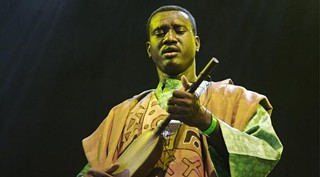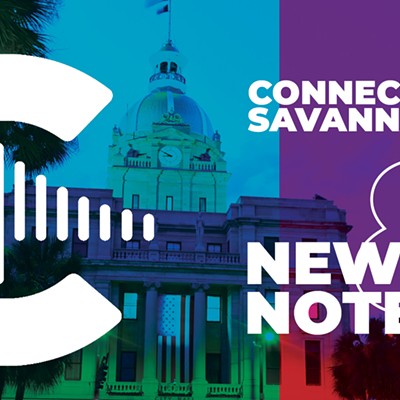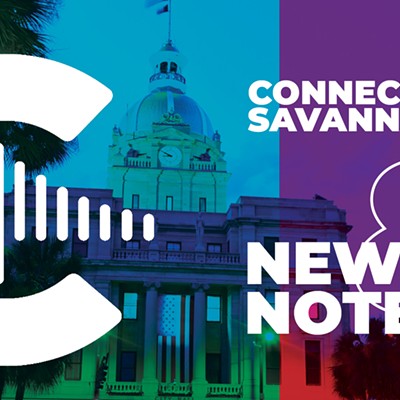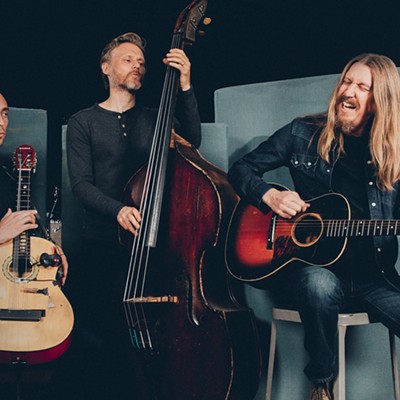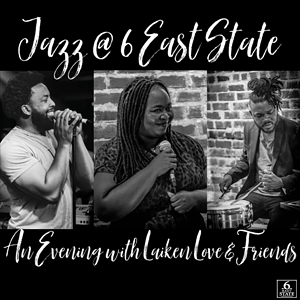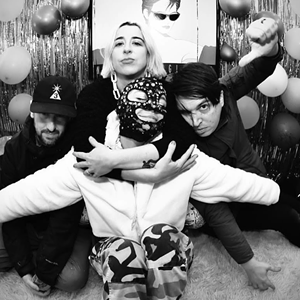Let me get right to the point: Bassekou Kouyate is one of the best musicians in the world today. But you don’t have to take my word for it.
Check him out on YouTube, whether in concert or just in his living room with a few friends, tearing it up on his n’goni, an African lute–like instrument that is an ancestor to the banjo. His fingers move in a blur, playing complex, lilting runs up and down the neck of this deceptively simple yet amazingly versatile instrument.
You can see Bassekou Kouyate this Friday and Saturday at the Charles H. Morris Center as part of the Savannah Music Festival. For this gig he is traveling with his backing band, N’Goni Ba, which I’m told simply means “n’goni band.”
Like I said, deceptively simple.He’ll be sharing a double bill with another musician who’s not too shabby, jazz/prog/folk guitar whiz Bill Frisell.
Some people will know Kouyate from his collaborations with the U.S. banjo master Bela Fleck, who performed at the Savannah Music Festival last year with a group of African traditional musicians. We recently had an e–mail interview with Kouyate, who is actually the son of the great Malian n’goni master Moustapha Kouyate.
The younger Mr. Kouyate’s English is not the best — then again, it’s a lot better than my Fula, the main language in his part of Mali, his home country in Africa. So translator Violet Diallo kindly helped us out.
What makes the n’goni such a special instrument?
Bassekou Kouyate: First of all it has a history — one of the longest in Africa. Next, it is adaptable and has changed over the centuries from being based on a calabash, which was fragile, to being made of wood like mine today.
It also has a lot of music composed for it by master players over the century and this has inspired each one to elaborate on the music he was taught in the family, and to compose his own – both the music and lyrics: you have to know how to do both.
Then there is the special voice of the n’goni which can slide around the main notes, and is not fixed to specific notes like many other instruments. In short it is just like the human voice and can adapt to any musical style.
How did your father teach you to play the n’goni ? Have you learned anything about the instrument that your father didn’t know?
Bassekou Kouyate: The traditional way of learning to play an instrument, or singing, is to listen to a master player or a vocalist, and try to imitate until you can do it too. I am still learning from my father and my grandfather through very old recordings (my father’s was made without his knowledge – he was against anything electric). I keep the CDs in my car in Bamako and listen to them often driving on the road to my village.
No, I don’t know anything new about the instrument that my father played: I’m still his student, but I do know some things he never suspected about how you can make n’gonis of different sizes with different sounds, and you can play types of music my father never heard, but I think he’d have liked them.
Unfortunately most Americans are not familiar with Mali and its musical tradition. Please describe what makes your home country so unique and why the music there is so influential.
Bassekou Kouyate: Mali is a huge county, like the United States, but until quite recently people in the country lived a very traditional life: and even in town it is usual to find families of around 50 people all living around one yard, and of all different ages.
Each area is home to a mixed population, but has one ethnic group that is recognized as really belonging there: the Bamana in Segou, the Fula in Mopti, the Sonink in Kayes, the Touareg in Timbuktou and Gao.
Each of these groups preferred their own language, their special food, ways of dressing, kinds of work, and of course their own music. It is because the modern ways came quite late to Mali that people are still close to all these things from their own ethnic groups.
With independence (we are celebrating our 50th anniversary this year) we began to take a real pride in our regional types of music that the first government encouraged. Between the local orchestras that were encouraged in every town and village, the start of the national radio, and national competitions for the arts, there was a great swell of interest in a whole variety of types of music, and this has carried on to this day: it is why Mali is so rich in music and you are all welcome to come from North America to come and hear it for yourselves.
Just take a walk in the streets on a Friday or Saturday night, or call at a wedding party on Thursday or Sunday
What can African music teach musicians from other genres? What have you learned from other genres?
Bassekou Kouyate: I think we can learn a lot from listening to wonderful masters of music, just like my father. Then we can see how inventive Americans are and how much they love to dance. We can learn a lot from their generosity and willingness to listen to other people’s music, even if it seems a bit strange to them at first. I don’t think we are always very good at that – we always want to stay with our own regional music.
What can Americans learn from us? Well I hope they know from all the Malians that come to North America that we have a real culture of music, and that we too like to get people to dance and are sensitive to their reactions: I hope they feel and hear that.
What has your friendship with Bela Fleck meant to you personally and to your career?
Bassekou Kouyate: From the time he came to see me in Bamako and began to record he sessions we played together, Bela is like a real brother. I have never known anyone so quick to pick up other people’s music — he’s extraordinary. I am really grateful to him for the opportunity to play this year’s tour with him.
Can you imagine what it means that we have been introduced all over the US by Bela, and immediately after he won his two Grammys – we are so lucky! And it has been so good to tour with his entire group. What an experience.
Savannah Music Festival
Bassekou Kouyate
When: April 2 & 3, each day at 6:30 and 9 p.m.
Where: Charles H. Morris Center, 10 E. Broad St.
Tickets: $32
Info: savannahmusicfestival.org

